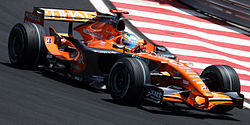  The Spyker F8-VII (top) and the Force India VJM-01 (bottom) | |||||||||||
| Category | Formula One | ||||||||||
|---|---|---|---|---|---|---|---|---|---|---|---|
| Constructor | Spyker/Force India | ||||||||||
| Designers | Mike Gascoyne (Chief Technical Officer) James Key (Technical Director) Mark Smith (Design Director) John McQuilliam (Chief Designer) Mike Wroe (Head of Electronics) Simon Phillips (Head of Aerodynamics) | ||||||||||
| Predecessor | Midland M16 | ||||||||||
| Successor | Force India VJM02 | ||||||||||
| Technical specifications | |||||||||||
| Chassis | Carbon-fibre and honeycomb composite monocoque | ||||||||||
| Suspension (front) | Unequal length composite wishbones | ||||||||||
| Suspension (rear) | Unequal length composite wishbones | ||||||||||
| Length | 4,790 mm (189 in) | ||||||||||
| Width | 1,800 mm (71 in) | ||||||||||
| Height | 950 mm (37 in) | ||||||||||
| Axle track | Front: 1,480 mm (58 in) Rear: 1,418 mm (56 in) | ||||||||||
| Wheelbase | More than 3,000 mm (118 in) | ||||||||||
| Engine | Ferrari 056 2006-spec (2007) Ferrari 056 2007-spec (2008) 2,398 cc (146 cu in) V8, naturally aspirated, mid-engine, longitudinally mounted | ||||||||||
| Transmission | Spyker/Ferrari 7 forward + 1 reverse Longitudinal with electrohydraulic sequential gear change | ||||||||||
| Power | 750 hp (559 kW) @ 17000 rpm | ||||||||||
| Fuel | Shell V-Power | ||||||||||
| Tyres | Bridgestone Potenza | ||||||||||
| Competition history | |||||||||||
| Notable entrants | | ||||||||||
| Notable drivers | 20. 21. 21. 21. 21. | ||||||||||
| Debut | 2007 Australian Grand Prix | ||||||||||
| Last event |
| ||||||||||
| |||||||||||
The Spyker F8-VII (subsequently known as the Force India VJM01) was a Formula One car, constructed by Spyker F1 that competed in the 2007 Formula One World Championship. A "B Specification" car named the Spyker F8-VIIB was launched at the Italian Grand Prix and used for the remainder of the 2007 season. The engine of Spyker F8-VII car was Ferrari 056 despite the team opted for 2006-spec engine due to cost reasons. For the 2008 World Championship, Force India used a slightly modified version of the F8-VIIB, called the Force India VJM01 named after team owners Vijay Mallya, Jan Mol and Michiel Mol. The VJM01 used 2007-spec Ferrari 056 engines instead of 2008-spec.
Contents
- Overview
- Design
- Naming
- B Specification car
- 2008 season
- Later uses
- Other events
- Complete Formula One results
- References
- External links
The F8-VII was the only car constructed by Spyker F1 in their own right after their take-over from the struggling Midland F1 team part way through 2006.



